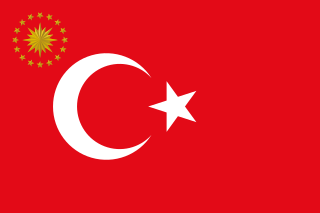
The president of Turkey, officially the president of the Republic of Türkiye, is the head of state and head of government of Turkey. The president directs the executive branch of the national government and is the commander-in-chief of the Turkish military. The president also heads the National Security Council.

Recep Tayyip Erdoğan is a Turkish politician serving as the 12th and current president of Turkey since 2014. He previously served as prime minister of Turkey from 2003 to 2014 and as mayor of Istanbul from 1994 to 1998. He founded the Justice and Development Party (AKP) in 2001, leading it to election victories in 2002, 2007, and 2011 general elections before being required to stand down upon his election as president in 2014. He later returned to the AKP leadership in 2017 following the constitutional referendum that year. Coming from an Islamist political background and self-describing as a conservative democrat, he has promoted socially conservative and populist policies during his administration.

Lèse-majesté or lese-majesty is an offence against the dignity of a ruling head of state or the state itself. The English name for this crime is a borrowing from the French, where it means "a crime against The Crown."

Human rights in Turkey are protected by a variety of international law treaties, which take precedence over domestic legislation, according to Article 90 of the 1982 Constitution. The International Covenant on Civil and Political Rights (ICCPR) was not signed by Turkey until 2000. As of today, however, Turkey is party to 16 out of 18 international human rights treaties of the United Nations. The issue of human rights is of high importance for the negotiations with the European Union (EU). Acute human rights issues include in particular the status of Kurds in Turkey. The Kurdish–Turkish conflict has caused numerous human rights violations over the years. There is an ongoing debate in the country on the right to life, torture, freedom of expression as well as freedoms of religion, assembly and association.
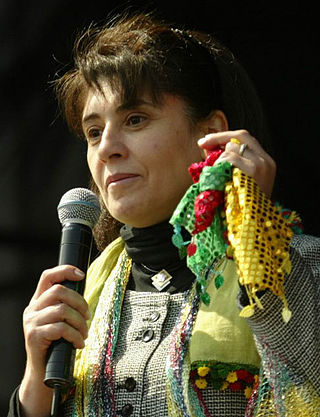
Leyla Zana is a Kurdish politician from Kurdish descent. She was imprisoned for ten years for her political activism, which was deemed by the Turkish courts to be against the unity of the country. She was awarded the 1995 Sakharov Prize by the European Parliament but was unable to collect it until her release in 2004. She was also awarded the Rafto Prize in 1994 after being recognized by the Rafto Foundation for being incarcerated for her peaceful struggle for the human rights of the Kurdish people in Turkey and the neighbouring countries.
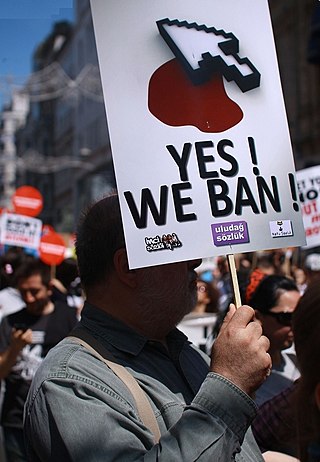
Censorship in Turkey is regulated by domestic and international legislation, the latter taking precedence over domestic law, according to Article 90 of the Constitution of Turkey.

Crime in Turkey is combated by the Turkish police and other agencies. Since the 1990s, overall crime in Turkey has been rising. As of 2014, Turkey has seen a 400% rise in crimes. In 1994, the number of arrested prisoners was recorded as 38,931; 20 years later, as of the beginning of October 2014, the number of prisoners has reached 152,335. According to the data provided by the Ministry of Justice, terrorism and homicide rate has been decreasing year by year after 2014 in Turkey, terrorism is almost never seen.
Capital punishment was abolished in Turkey in 2004, and no prisoners have been executed since October 1984. The method of execution was hanging.

Sebahat Tuncel is a Turkish politician of Kurdish origin, women's rights advocate, former nurse and member of the Parliament in Turkey. She was elected a member of parliament while being in prison.
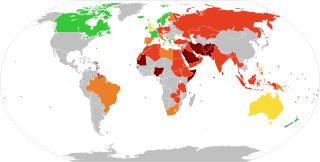
A blasphemy law is a law prohibiting blasphemy, which is the act of insulting or showing contempt or lack of reverence to a deity, or sacred objects, or toward something considered sacred or inviolable. According to Pew Research Center, about a quarter of the world's countries and territories (26%) had anti-blasphemy laws or policies as of 2014.
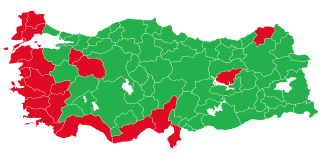
A constitutional referendum on a number of changes to the constitution was held in Turkey on 12 September 2010. The results showed the majority supported the constitutional amendments, with 58% in favour and 42% against. The changes were aimed at bringing the constitution into compliance with European Union standards. Supporters of Turkish EU membership hope constitutional reform will facilitate the membership process.

General elections were held in Turkey on 12 June 2011 to elect the 550 members of Grand National Assembly. In accordance to the result of the constitutional referendum held in 2007, the elections were held four years after the previous elections in 2007 instead of five.

Presidential elections were held in Turkey on 10 August 2014 in order to elect the 12th President. Prime Minister Recep Tayyip Erdoğan was elected outright with an absolute majority of the vote in the first round, making a scheduled run-off for 24 August unnecessary.
Article 312 was a controversial article of the Turkish Penal Code relating to inciting racial or religious hatred encouraging people to disobey the law. It has been used to prosecute journalists for writing about Kurdish issues.

Osman Kavala is a businessman, activist and philanthropist who has supported numerous civil society organizations in Turkey since the early 1990s. Kavala is the founder and chair of the board of Anadolu Kültür, an Istanbul-based nonprofit arts and culture organization. In 2019, he received the European Archaeological Heritage Prize from the European Association of Archaeologists for his efforts to protect and preserve significant examples of cultural heritage in danger in Turkey and the Ayşenur Zarakolu Freedom of Thought and Expression Award by Human Rights Association's Istanbul branch. His arrests in Turkey caused the European Court of Human Rights and ambassadors from ten Western countries to demand his release. These demands were rejected by Turkish courts and president Erdoğan.
Doğan Güzel is a Kurdish Turkish-born cartoonist. He is best known for his satirical comic strip Qirix.
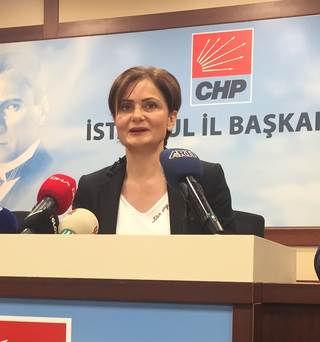
Canan Kaftancıoğlu is a Turkish physician and politician. She is the president of the Republican People's Party's (CHP) in Istanbul. In September 2019, she was sentenced to 9 years and 8 months imprisonment for insulting the president and terrorism related charges but after an appeal by the CHP, the Court of Cassation reduced her sentence to over 4 years and 11 Months in May 2022. The Turkish government under President Recep Erdoğan's administration put her on trial for tweeting about the Armenian genocide and assassinations of the three female members of the Kurdistan Workers Party (PKK) in Paris. Her trial came in the wake of her party's victory in regional elections in Istanbul. During her trial she read out a poem by Nazim Hikmet.
The Kurdistan Workers' Party (PKK) announced a ceasefire on the 13 April 2009, declaring they would only retaliate in self-defense. The ceasefire was encouraged by the electoral success of the Democratic Society Party (DTP) in the municipal elections of 2009. Then in May 2009, the president of the Kurdistan Communities Union (KCK) Murat Karayilan released a statement supportive of an eventual peace process. Later, the PKK prolonged the ceasefire on the 1 June until the 15 July 2009. On the 15 July the DTP organized a manifestation in support of a peace process which was attended by tens of thousands of people in Diyarbakir, and the PKK again prolonged their ceasefire until the 1 September 2009. The Human Rights Association (IHD), Freedom and Solidarity Party and the Labour Party also supported a potential peace process.

Recep Tayyip Erdoğan is the President of Turkey and was compared with Gollum, a figure of J. R. R. Tolkien trilogy The Lords of the Rings in social media posts, which led to trials for insulting the president.















